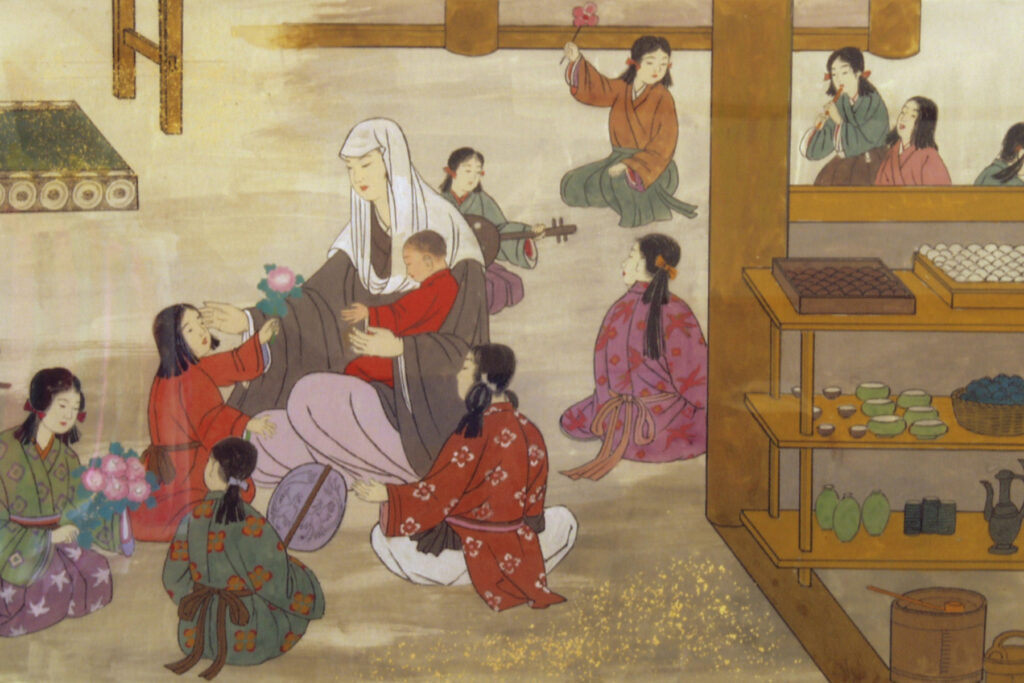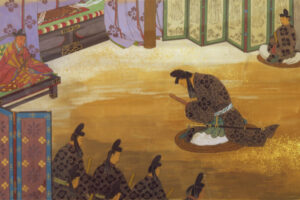Wake no Hiromushi and the Origins of Foster Care
第2回:和気清麻呂と姉・広虫 — 8世紀の里親と慈悲
Wake no Hiromushi, the elder sister of Wake no Kiyomaro, welcomed orphans into her own household more than a thousand years ago. By raising them as her own and granting them family names, she quietly pioneered what can be called the origins of Japan’s foster care system. While her brother defended the imperial line through politics, Hiromushi illuminated society by protecting and nurturing human lives.

A painting depicting Wake no Hiromushi gently embracing orphans, surrounded by children offering flowers and playing music. The scene symbolizes compassion and the nurturing spirit of foster care. (Source: Wake Shrine, 1385 Fujino, Wake Town, Okayama Prefecture, Japan – https://wake-jinjya.com/)
Introduction – A Forgotten Sister
When people hear the name Wake no Kiyomaro, they think of the man who stood against the powerful monk Dōkyō and preserved the imperial line. Yet few outside of Japan—and even few within—know of his elder sister, Wake no Hiromushi. Her life may not have carried the same dramatic confrontation with political usurpation, but it revealed something equally vital: the quiet creation of compassion-based institutions. In her home, more than a thousand years before the modern era, we find the seeds of foster care.
A Household of Compassion
Hiromushi was born three years before her younger brother Kiyomaro, in 733. When she grew up, she entered the imperial court as a lady-in-waiting. There she married Katsuragi no Henushi, a gentle man deeply troubled by the sight of countless children left orphaned by war and famine. Instead of turning away, the couple opened their home. They raised dozens of these orphans as their own, and when the children grew to adulthood, they even allowed them to bear the family name “Katsuragi.”
This act, simple yet revolutionary, marks the beginning of Japan’s foster care tradition. It was not decreed by law, nor mandated by a government. It began with a household guided by compassion.
Contrast with the West
To grasp the significance of Hiromushi’s actions, we must look at what was happening elsewhere in the world. In medieval Europe, orphans were often handed over to churches, hospitals, or even slave traders. In the thirteenth century, the city of Brescia went so far as to pass a law declaring, “Pagans, prostitutes, and orphans must not exist in the city or its surroundings. Those who harbor them will be fined.” In other words, the social default was exclusion.
Japan, by contrast, saw a noble family in the eighth century voluntarily embracing children without parents, raising them as kin, and granting them names that tied them to community. This was not charity in the Western sense—it was the recognition of every child as part of the nation’s living treasure, ohomikura, the people who are the emperor’s great storehouse.
Widowhood and Religious Devotion
Tragedy struck when Hiromushi’s husband passed away. Grief-stricken, she took vows as a nun and received the Dharma name Hōkin. Yet even after taking the veil, her compassion did not end. She continued to care for children and served as a moral pillar at court.
So respected was her life of service that she was granted the rare title Shinshu Daibu Ama-i, an honor for a woman who combined official duty with religious devotion. Her reputation for integrity was such that later chronicles noted, “Never was it heard that Hōkin spoke of another’s faults.”
The Legacy of Hiromushi
If Kiyomaro was the defender of imperial legitimacy, Hiromushi was the defender of social compassion. Together, they embodied the two axes of Japanese governance: the preservation of rightful authority, and the nurturing of the people as treasure.
When we peel a mikan, we remember Suinin and Tajimamori. When we speak of loyalty, we remember Kiyomaro. And when we speak of care, we must remember Hiromushi, who centuries before modern states imagined social welfare, quietly practiced it in her own household.
Her story reminds us that civilizations are not only saved on battlefields or in courts of power, but also in the simple decision to open a door, to feed a hungry child, and to call a stranger “family.”


